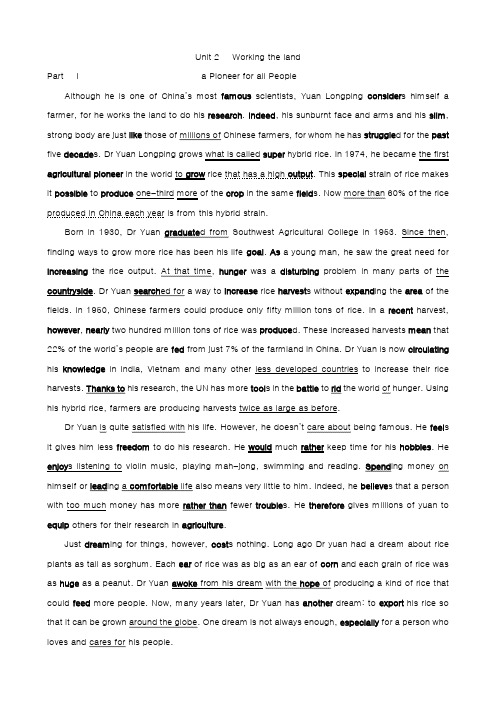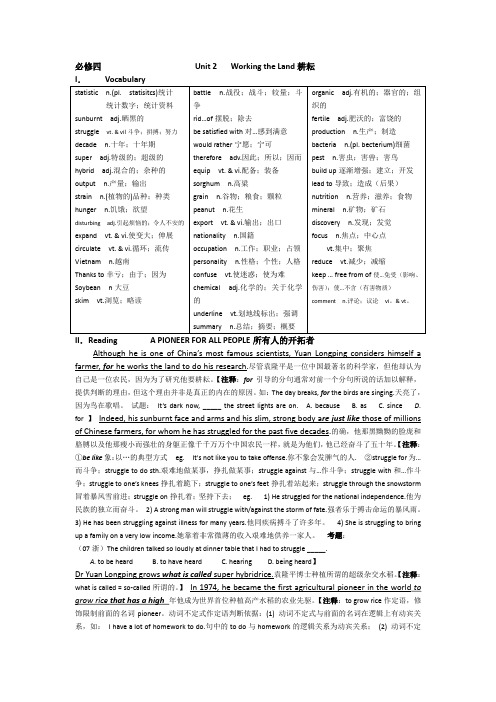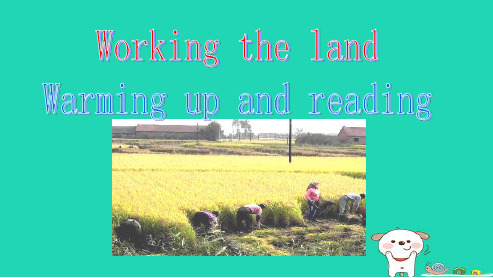book4unit2(修订)
人教版Book 4 unit 2 Grammar(共28张PPT)

+to do /doing
hate
love
prefer
remember
regret
try stop begin forget like start
用作宾语
①只能后接动名词作宾语的动词,常见的有 avoid,consider,enjoy,keep,finish, suggest,dislike,delay,escape,cannot help,imagine,mind,miss,practise, cannot stand等。如:
There is no sense (in ) __c_ri_t_ic_i_s_i_n_g_______ him. (criticise)
There is no point (in)_e_x_p__la_i_n_i_n_g___ the reason now. (explain)
There is no need _to__t_e_ll___her.(tell)
-ing form used as the subject(主语)
Practise Ex.2
rewrite the sentences using ---ing form p13
1. Helping people in need of help is nice. 2. Growing super hybrid rice is not easy. 3. Learning more about farming is not difficult. 4. In the countryside doing research is not as easy as in the city. 5. Getting rid of hunger is very important in some African countries. 6. Explaining this again is important or we will confuse the students.
(完整版)新人教版Book4Unit2WorkingtheLand课文

Unit 2 Working the landPart I a Pioneer for all PeopleAlthough he is one of China’s most famous scientists, Yuan Longping consider s himself a farmer, for he works the land to do his research. Indeed, his sunburnt face and arms and his slim, strong body are just like those of millions of Chinese farmers, for whom he has struggle d for the past five decade s. Dr Yuan Longping grows what is called super hybrid rice. In 1974, he became the first agricultural pioneer in the world to grow rice that has a high output. This special strain of rice makes it possible to produce one-third more of the crop in the same field s. Now more than 60% of the rice produced in China each year is from this hybrid strain.Born in 1930, Dr Yuan graduate d from Southwest Agricultural College in 1953. Since then, finding ways to grow more rice has been his life goal. As a young man, he saw the great need for increasing the rice output. At that time, hunger was a disturbing problem in many parts of the countryside. Dr Yuan search ed for a way to increase rice harvest s without expand ing the area of the fields. In 1950, Chinese farmers could produce only fifty million tons of rice. In a recent harvest, however, nearly two hundred million tons of rice was produce d. These increased harvests mean that 22% of the world’s people are fed from just 7% of the farmland in China. Dr Yuan is now circulating his knowledge in India, Vietnam and many other less developed countries to increase their rice harvests. Thanks to his research, the UN has more tool s in the battle to rid the world of hunger. Using his hybrid rice, farmers are producing harvests twice as large as before.Dr Yuan is quite satisfied with his life. However, he doesn’t care about being famous. He feel s it gives him less freedom to do his research. He would much rather keep time for his hobbies. He enjoy s listening to violin music, playing mah-jong, swimming and reading. Spend ing money on himself or lead ing a comfortable life also means very little to him. Indeed, he believe s that a person with too much money has more rather than fewer trouble s. He therefore gives millions of yuan to equip others for their research in agriculture.Just dream ing for things, however, cost s nothing. Long ago Dr yuan had a dream about rice plants as tall as sorghum. Each ear of rice was as big as an ear of corn and each grain of rice was as huge as a peanut. Dr Yuan awoke from his dream with the hope of producing a kind of rice that could feed more people. Now, many years later, Dr Yuan has another dream: to export his rice so that it can be grown around the globe. One dream is not always enough, especially for a person who loves and cares for his people.Part II Chemical or Organic Farming?Over the past half century, using chemical fertilizers has become very common in farming. Many farmers welcome d them as a great way to stop crop disease and increase production. Recently, however, scientists have been finding that long-term use of these fertilizers can cause damage to the land and, even more dangerous, to people’s health.What are some of the problems caused by chemical fertilizers? First, they damage the land by kill ing the helpful bacteria and pests as well as the harmful ones. Chemicals also stay in the ground and underground water for a long time. This affect s crops and, therefore, animals and humans, since chemicals get inside the crops and cannot just be wash ed off. These chemicals in the food supply build up in people’s bodies over time. Many of these chemicals can lead to cancer or other illnesses. In addition, fruit, vegetable s and other food grown with chemical fertilizers usually grow too fast to be full of much nutrition. They may look beautiful, but inside there is usually more water than vitamin s and mineral s.With these discover ies, some farmers and many customer s are beginning to turn to organic farming. Organic farming is simply farming without using any chemicals. They focus on keeping their soil rich and free of disease. A healthy soil reduce s disease and helps crops grow strong and healthy. Organic farmers, therefore, often prefer using natural waste from animals as fertilizer. They feel that this makes the soil in their fields richer in minerals and so more fertile. This also keeps the air, soil, water and crops free from chemicals.Organic farmers also use many other method s to keep the soil fertile. They often change the kind of crop in each field every few years, for example, growing corn or wheat and then the next year peas or soybeans. Crops such as peas or soybeans put important mineral s back into the soil, making it ready for crops such as wheat or corn that need rich and fertile soil. Organic farmers also plant crops to use different level s of soil, for example, planting peanuts that use the ground’s surface followed by vegetables that put down deep root s. Some organic farmers prefer planting grass between crops to prevent wind or water from carry ing away the soil, and then leaving it in the ground to become a natural fertilizer for the next year’s crop. These many different organic farming methods have the same goal: to grow good food and avoid damaging the environment or people’s health.。
《新视野英语教程(第三版)》教学资源book4Unit2-Section B

Para. 6-7
I remember I complained about the truck, but I don't remember you ever complaining when you came home tired from work and I asked you for money to go on the road again. If you did complain, I guess I didn't hear you. I was too wrapped up in my problems to think of yours.
Para. 2-3
My Darling Wife, This is a letter that no man ever wants to write, but
I'm lucky enough to have some time to say what I've forgotten to say so many t do we know about the driver’s life? She’s a beautiful, diligent and tender-hearted woman.
Intensive Reading
Para. 1
In the northern Canadian mountains, one driver was found dead in his truck after a bad snowstorm. He perhaps lived for a couple of hours until the cold got him. He had written his last letter to his wife.
高中英语必修四-unit2课文详解book4-unit2

必修四Unit 2 Working the Land耕耘II.Reading A PIONEER FOR ALL PEOPLE所有人的开拓者Although he is one of China’s most famous scientists, Yuan Longping considers himself a farmer, for he works the land to do his research.尽管袁隆平是一位中国最著名的科学家,但他却认为自己是一位农民,因为为了研究他要耕耘。
【注释:for引导的分句通常对前一个分句所说的话加以解释,提供判断的理由,但这个理由并非是真正的内在的原因。
如:The day breaks, for the birds are singing.天亮了,因为鸟在歌唱。
试题:It’s dark now, _____ the street lights are on. A. because B. as C. since D. for 】Indeed, his sunburnt face and arms and his slim, strong body a re just like those of millions of Chinese farmers, for whom he has struggled for the past five decades.的确,他那黑黝黝的脸庞和胳膊以及他那瘦小而强壮的身躯正像千千万万个中国农民一样,就是为他们,他已经奋斗了五十年。
【注释:①be like象:以…的典型方式eg. It's not like you to take offense.你不象会发脾气的人. ②struggle for为…而斗争;struggle to do sth.艰难地做某事,挣扎做某事;struggle against与…作斗争;struggle with和…作斗争;struggle to on e’s knees挣扎着跪下;struggle to one’s feet挣扎着站起来;struggle through the snowstorm 冒着暴风雪前进;struggle on挣扎着;坚持下去;eg. 1) He struggled for the national independence.他为民族的独立而奋斗。
教科版Book 4 Unit 2 Grammar (11PPT)

(4) My uncle came to visit us. My uncle brought some sweets for me. (every time)
Nouns ending in ch, sh, o, s, x, or z add -es.
Note: If the -ch ending is pronounced with a ‘k’ sound, we add -s rather than –es. Example: stomach – stomachs
Every time my uncle came to visit us, he brought some sweets for me.
(5) He looks in high spirits today. He might have sold his cows at a high price. (as if)
produce a lot of fruit each year. (that) He owns some fruit trees that produce a lot of fruit each year.
(2) The weather might be awful. He would work in the field. (no matter how)
Note: Some words ending in -f or -fe add -s. Example: chief – chiefs, cliffs – cliffs, roof – roofs, giraffe – giraffes.
《新视野英语教程(第三版)》教学资源book4Unit2-Section A

triumph quickly throws the apple over the fence. I run to pick it
up, holding it in my frozen fingers. In my world of death this
高中英语人教版必修四Book_4Unit_2_working_the_land_warming_up_and_readingppt课件

A planet was named after him.
A Pioneer for All People
Father of hybrid rice
人就像一粒种子。要做一粒好的种子,身体、 精神、情感都要健康。种子健康了,我们每个人 的事业才能根深叶茂,枝粗果硕。
—— 袁隆平
What do you think of Yuan? Why do you think so?
Para 1: Appearance & achievements: What does Yuan Longping look like?
Yuan Longping considers himself as a _____ rather ftahramnear scientist. He has ______ face and arms and asu_nb_u_r,n_t ___ body.
Plough / turn over the soil
Sow the seed
Transplant rice seedlings How to increase the rice output
rid the soil of the weed
Book4 Unit2 Smart Cars

1 What does “smart” mean? 2 Why do people like cars? 3 What do you think “smart cars” can do and what do they depend on? 4 What other words are used related to cars?
Discussion
The merits and demerits of cars.
Listest/cnn/all/200809/200 80902141330.html
Smart Cars
Relevant Information:
Global Reading
1. Part division 2. New words explanation
Parts Part I
Paras Paras 1-3
Main Ideas
New technology will have a dramatic impact on _____ and _________in the cars highways 21st century. With the aid of advanced technology, smart cars will be so designed that they can help eliminate ______________, traffic accidents determine their own _______________ precise locations traffic jams and warn of ___________.
The crucial element of the future smart cars will be sensors.
- 1、下载文档前请自行甄别文档内容的完整性,平台不提供额外的编辑、内容补充、找答案等附加服务。
- 2、"仅部分预览"的文档,不可在线预览部分如存在完整性等问题,可反馈申请退款(可完整预览的文档不适用该条件!)。
- 3、如文档侵犯您的权益,请联系客服反馈,我们会尽快为您处理(人工客服工作时间:9:00-18:30)。
Unit 2 Sports events
基础整理与记忆
Ⅰ.联想记忆(根据提示写出相应的词汇以及相关短语)
1.adj.愉快的,高兴的→take 以……为乐
2.n.缺席,不在场;不存在→be 缺席……
3.joy n.喜悦,欢乐→使某人高兴的是
4.n.& v t.尝试,努力,试图→试图/尝试做某事5.n.协会,社团;关联;联想→把……和……联系起来6.hang on(在逆境中)坚持→闲逛
7.pass sth. on (to sb.) 转交,传给,递给→使世代相传;流传
8.根据传统→the tradition of沿袭……的传统
9.使复活;使充满生机→养育
10.使……得到控制→失去控制
11.偶然地→偶然地
Ⅱ.构词记忆(根据提示写出相应的词汇及其派生词)
1.compete v i.竞争;比赛→adj.竞争的
→n.竞争者→n.比赛;竞争2.tradition n.传统;风俗→adj.传统的
3.nation n.国家,民族;全体国民→adj.国家的
4.excite v t.使激动,使兴奋→n.激动;兴奋
5.n.技术,工艺,技巧
→technical adj.技术的;工艺的→n.技术;科技
Ⅲ.语境填词(根据提示用适当的单词或短语填空)
1.The boxer was (愉快的) to attend the (开幕式).
2.The famous (记者的缺席) from the meeting was (不寻常的).3.The (冠军) and his teammates were (兴奋的) and jumped with (快乐).4.He thought the result was (不公平的) and he (试图) to make a (口哨) to show his anger.
5.The citizens think these (协会) are of great (重要).
Ⅳ.语境记忆(背诵语段,记忆单元词汇)
The gymnastics champion felt honourable and delighted to be invited to the opening ceremony of the technique competition in the stadium. It was of great significance to him. He would be best-known to the citizens.
Ⅴ.课文原句背诵
1.Below are_pictures_of_a_few_popular_sports.
下面是几项流行体育运动的图画。
2.It_was a Frenchman,Pierre de Coubertin,who brought the Olympics back to life.
让奥运会得以重生的是一个法国人皮埃尔·德·顾拜旦。
3.The Eagles went home angry_and_bitter because they didn’t win the tournament.
鹰队在联赛上铩羽而归,既恼火又愤愤不平。
基础巩固与训练
Ⅰ.英文释义连连看
1.origin A.a very old custom, belief, or story
2.power B.to form a connection in your mind between different people or things 3.associate C.the respect that people have for sb. who achieves sth. great, is very
powerful, or behaves in a way that is morally right
4.honour D.the ability to influence or control what people do or think 5.tradition E.the place or moment from which sth. begins to exist
Ⅱ.用所给词的适当形式填空
1.In his (excite), Peter rushed out and forgot his keys.
2.The police knew all about his (associate) with organized crime.
3.Mark will be in charge in Steve’s (absent).
4.There’s been some (significance) progress.
5.Now let’s look at the main (nation) and international news.
Ⅲ.词义猜测题——用本单元词汇替换划线部分
1.I’m glad to meet all of you here!
2.The design is of great importance to us.
3.Mo Yan is a famous writer all over the world.
4.I tried to persuade him to give up smoking,but he didn’t listen to me.
5.You’ll have to go now,or you’ll miss the train.
Ⅳ.微写作(11)
1.作为一名世界冠军,他喜欢和他的队友分享快乐与悲伤。
2.与此同时,他喜欢上网去了解他的对手(rival)。
3.他认为这对他的未来发展很重要。
提示:黑体部分用本单元词汇表达。
连句成篇(将以上句子连成一篇50词左右的英语短文)
________________________________________________________________________________ ________________________________________________________________________________ ________________________________________________________________________________ Ⅴ.微语法(11)——情态动词的基本用法
1.I________ use a clock to wake me up because at six o’clock each morning the train comes by my house.
A.couldn’t B.mustn’t C.shouldn’t D.needn’t
2.Days later,my brother called to say he was all right,but______ say where he was. A.mustn’t B.shouldn’t C.wouldn’t D.mightn’t
3.I got close enough to hear them speaking Chinese,and I said “Ni Hao,” just as I ________ do in China.
A.must B.might C.can D.should
4.It’s quite warm here; we________ turn the heating on yet.
A.couldn’t B.mustn’t C.needn’t D.wouldn’t
5.If you ________ smoke,please go outside.
A.can B.should C.must D.may。
